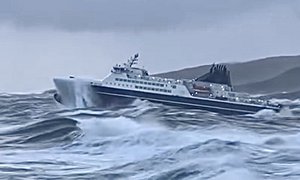Ken Symon
New players have bought up acreage in North Sea fields with many joining the »dash for gas« as the convergence of UK and continental European gas prices helped a revival of corporate interest in the UK gas market.
This wave of new interest in an intensity not seen since the 1970s and early Eighties is transforming the offshore industry as smaller, independent players seek niche opportunities to generate value for their shareholders. The developments are being watched closely by the industry around the world.
Companies like Consort Resources, led by Colin Moynihan, the former UK Energy minister, are entering the market. Consort, which was formed in 2000, did its first deal in June of that year buying TotalFinaElf?s 49% interest in the Caister gas field from operator Conoco. A second deal between the same two companies was completed in December 2000 in which Consort acquired the Orca and Beta probable developments.
Consort accelerated its growth this calendar year with the acquisition of TXU?s entire UK upstream portfolio for £138 million. The assets traded represented 130 bcf of remaining gas sales and moved Consort into the top 10 of companies with remaining gas reserves in the UK Southern Gas Basin.
Highland Energy is another recent player which entered the UK market in May 2000 through its acquisition of Wintershall?s UK portfolio. Highland completed a further three deals involving Statoil CalEnergy and BP. The company?s strategy is to focus on its producing assets plus low risk exploration and new development upside that are material enough to provide significant growth for a small, start-up company but which would not figure on oil major?s materiality radar.
Dublin-based Tullow Oil entered the UK upstream sector by acquiring assets from BP for £201 million. BP had been required to dispose of the interests as a condition of receiving regulatory approval from the European Commission for its global merger with ARCO.
The move followed a corporate review by Tullow, listed on both the UK and Irish stock markets, which resulted in it repositioning itself as a fully integrated exploration and production (E&P) company with a focus on active exploration.
Roots Gas is another recently formed E&P company which is concentrating on buying producing assets in the southern gas basin. In January 2001, Roots acquired a 50% stake in the Audrey gas field from Centrica for an undisclosed sum. The company?s aim is to be a very low cost base player intending to gain additional value from operational efficiencies.
Marubeni, one of Japan?s leading general trading houses, is another recent entrant to the market by acquiring a package of non-operated assets from Veba Oil and Gas.
Bruce Dingwall and his management team colleagues at Aberdeen-based Venture Production are also convinced that they can capitalise on opportunities and extract shareholder value from propositions that may no longer be of interest to the biggest players.
»The majors are looking at bigger fields to give the level of profit they are looking for and that creates an opportunity for us in the marketplace,« Mr Dingwall says.
Dyas UK also typifies the trend in a way. The company sold off its North Sea interests in 1988 but returned to the province by buying half of Shell?s 4.357% interest in the Elgin/Franklin fields.
The number of niche players are likely to increase as the UK Government attempts to encourage oil companies not to ?sit on? undeveloped fields but to release them to other players who will want to go ahead with developing them.
At Offshore Europe in Aberdeen in September the industry also discussed new types of ownership contracts to help release blockages in the current contract system and allow new ways of combining to extract value.
Of course, the recent volatility in the oil and gas sector and particularly the fluctuating oil price following the events of September 11 has added an extra layer of uncertainty particularly where companies are working on tighter returns. But most of the companies remain confident, at least publicly, that they will make returns on their North Sea investments.
One factor that is encouraging is that the industry appears to have a closer relationship with the current UK government that at any time in the past. This relationship is the envy of many overseas-based companies and has provided comfort that companies will be able to invest for the longer term without facing major increases in the level of tax levied.
While these new entrants have been buying up acreage, a number of key participants in the energy services sector based in Scotland are looking around the world for where new opportunities can be found for techniques and practices developed in the North Sea. Three companies stand out as continuing to wage expansionary campaigns and being more likely to conduct take-overs abroad rather than themselves facing the prospect of being bought particularly by American players.
Sir Ian Wood, chairman and chief executive of the John Wood Group, has continued the remarkable programme of growth of the private company both organically (about 40%) and by acquisition (the remaining 60%) as it spreads its footprint to more and more areas of the world.
The acquisition of Houston-based Mustang Engineering means that the group?s institutional shareholder base has grown to more than 20%. This prompted the company to formally announce half-yearly accounts for the first time although it did nothing to dampen speculation that Wood Group will seek to float on the stock market to fund the next phase of its expansion.
Sir Ian said that North Sea offshore activity had stepped up significantly in 2001 and the Gulf of Mexico had also been very active. In 2002 the group will would continue to expand its international operations focusing particularly on the West African and North African markets.
Wood Group is seeking to combine leading edge engineering design work developed in the North Sea with its counterpart from the Gulf of Mexico. It received a boost in this with the award of a second multi-million pound design and development contract for the £650m BP Clair field west of Shetland. Bill Edgar, chairman of Wood Group Engineering, said he was delighted to have secured responsibility for »one of the most exciting developments in the North Sea for some time.«
ASCO is another oil support services company where the accent is very much on growth. Colin Manderson, the chief executive, hoped to be at the helm of the first Scottish company to go for an IPO (initial public offering) in 2001 but the plans to list on the New York Stock Exchange were shelved as the OSX oil services index went south.
Manderson has been concentrating on continuing to build ASCO into a truly global oil industry supply chain business with the level of capital currently available. The company is replicating its oil and gas logistics business offering in more arenas around the world. It has also opened up a new area of business, non-oil and gas waste logistics and quickly one its first contract in the field with more to follow.
Abbot Group is a third Scottish-headquartered energy services company which is looking to expand around the world and which is also more likely to acquired than be bought over. The record of expansion saw the share price double in a year prior to the post-September 11 volatility in the market.
In October Abbot completed the acquisition of Deutag of Germany for £134 million, with the combined group becoming one of the largest land drilling operations outside of North America and one of the world leaders in drilling rig design, construction and operation.
Alasdair Locke, the Abbot executive chairman, has shown the daring to step where others fear to tread by establishing a strong position within Iran. Abbot?s KCA Drilling subsidiary has won two major drilling contracts in the Middle Eastern country. In July it won a three year contract with TotalFinaElf worth $50m to supervise the drilling and rehabilitation of 28 onshore wells at the Dorood Field on Kharg Island. That followed the winning of a similar contract, announced in March, worth £54m to supervise the drilling of offshore wells for NIOC, the National Iranian Oil Company.
They say that fortune favours the brave and it looks likely to be very definitely so in this case. Abbot?s move into Iran, like their activities in Libya, which attracted negative comment particularly in Washington now looks less controversial in the light of attempts to build new levels of international co-operation following the terrorist attack on the World Trade Centre.
In an oil province which has never hit its expected peak production levels, recent entrants and longer-term players are using new and more entrepreneurial techniques to breathe in new life. Just as many commentators were prepared to write the North Sea off as ?mature? and past its peak, new ways of drilling for oil which expand the available reserves and extend its life have been introduced. A new wave of innovation and entrepreneurial spirit has transformed the North Sea.













